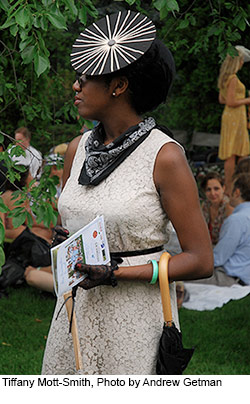
“If you date trans men, why don’t you just date, you know, a real man?” This question has definitely gotten me worked into a hold-my-purse, ready-to-scrap, tizzy a few times. But it pales in comparison to the declaration, “your partner is trans—you aren’t a lesbian.”
 Like many high femme cisgender women who love babies, baking, and jewelry, I was shoved into straight life based solely on my gender presentation and traditionally feminine interests regardless of whether or not I was satisfied sexually or spiritually.
Like many high femme cisgender women who love babies, baking, and jewelry, I was shoved into straight life based solely on my gender presentation and traditionally feminine interests regardless of whether or not I was satisfied sexually or spiritually.
Being declared a “femme lesbian” and “queer” by my first girlfriend and urban dictionary were both VERY happy surprises. A significantly less happy surprise came when I began dating someone coming out as trans and others declared I was no longer a lesbian. “You’re bisexual now,” or “No, you’re just hetero-flexible,” or even the occasional, “Are you sure you’re even queer?” I really love doing hard things (pun intended), but demanding your partner’s gender identity be respected and supported when that very act calls your identity into question is the kind of hard-to-do that sometimes feels impossible.
I, like Jade Salazar mentions in her piece Loving Butch Women, can only speak based on my personal attraction. To borrow her words and ever so slightly remix them for myself, I feel the moment I’m asked why I don’t just date “real” men, I am being told in addition to having no respect for my partner’s identity, this person has no understanding or appreciation of what it means to be a lesbian. However, theory suggests, no one truly understands what it means to be a lesbian outside of their own experience.
For instance, The Committee on Lesbian Health Research Priorities and the Institute of Medicine site:
“The term lesbian has been used to describe women who have sex with women, either exclusively or in addition to sex with men (i.e., behavior); women who self-identify as lesbian (i.e. identity); and women whose sexual preference is for women (i.e., desire or attraction). The lack of a standard definition of lesbian and of standard questions to assess who is lesbian has made it difficult to clearly define a population of lesbian women. How and where study samples were obtained can also affect the definition.”
That is to say, being a lesbian is complex and as such, the term is subjective and ever changing. We are more than an immutable adjective created by extremely privileged, long dead and buried white men. We are living, breathing, loving, thinking, changing, people who come in all shapes, sizes, colors, and abilities. To borrow from Salazar again, the question, “if you’re dating a trans man, why don’t you just date a real man,” roughly translates to: you are dating a person who does not fall within my limited mold— it makes me uncomfortable and so does your sexuality.
To that I say, “THIS, among other things, is what a lesbian looks like. Deal with it.”